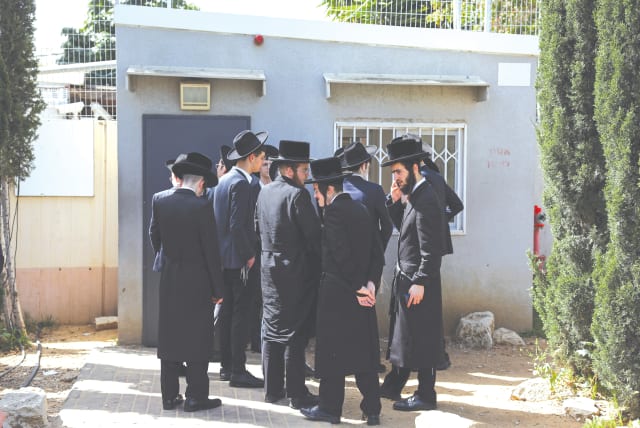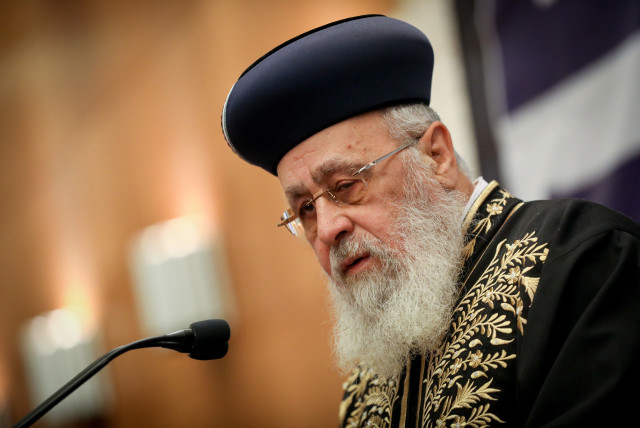Editor's Notes: Talk to haredim, not their leaders, about enlistment

Unlike traditional approaches that often focus on negotiations with haredi leaders, speaking directly to community members requires a nuanced understanding of their values, concerns, and aspirations.
Something is slowly changing within the haredi (ultra-Orthodox) communities in Israel. They feel the tension of the majority of Israelis who think they should be part of the national effort to protect the only Jewish state in the world – but at the same time, want to abide by the decisions of their rabbis and leaders against joining the Israel Defense Forces.
Most haredim in Israel know about the more than 500 IDF soldiers who were killed during this current war and understand that haredim are the only Jewish population that doesn’t have many casualties. Even Bedouin and Druze communities have buried many of their loved ones, soldiers who protected Israel.
The leaders of these haredi communities, though, have begun their offensive campaign, causing even more frustration among their non-haredi compatriots.
A few weeks ago, Sephardic Chief Rabbi Yitzhak Yosef sparked a debate by warning of a mass departure should the government mandate military service for the haredim. Yosef claimed that, if compelled to enlist, they would leave the country en masse, suggesting a significant disruption for the nation.
The chief rabbinic leader spoke bluntly, but a senior haredi politician explained that this is all tactical: Yosef and other leaders from this community are preparing for the negotiations on the draft law so that they can receive more for their constituencies.
Most Israelis are fed up with this behavior, as shown in the many polls that have recently been published. A February survey by Hiddush, an organization advocating for religious freedom and equality, revealed that more than three-fourths of Israelis (78%) support ending the draft exemption for the ultra-Orthodox. This includes an even higher percentage of non-haredim, since haredim comprise about 13% of the Israeli population, and the vast majority of them are opposed to ending the exemption.
The Hiddush survey shows that about 50% more non-haredim oppose the exemption from IDF service than one done by the Smith Institute, which showed that less than half (48%) opposed it.
ON THURSDAY, one of the most prominent and veteran haredi politicians spoke out for the first time about the draft law. Between the lines, it was clear that he was slowly internalizing the current state, but simultaneously, fighting back firmly. At a cornerstone-laying event for a haredi school in Tiberias, Degel HaTorah faction chairman MK Moshe Gafni spoke about the state’s “need for Torah scholars.”
“We are in a difficult predicament; we are in a complex situation,” Gafni began his speech. “We pray to the Holy One, Blessed be He, that this will end soon for the better.
“I sat yesterday with the families of the kidnapped,” he said. “I pray together with all of Israel that the kidnapped will return home safe and sound. It’s not a simple or easy story. Those who talk with the families – and I talk to them – find it unimaginable.
“But I want to tell you, this is one of the hardest periods for the people of Israel. We always knew how to emerge from darkness to great light – and it was thanks to the Torah scholars,” Gafni declared. “The Torah scholars who were present in all periods, even during the Holocaust. They sat in Poland, Hungary, and many other places – sat in bunkers and studied Torah.”
Elements of his speech almost sounded as if he was the leader of a Zionist party, but most of it was intended to explain that those who learn the Torah are equal to soldiers, if not more. “We are after 2,000 years of exile. The people of Israel returned to being Jewish people: returned to their land,” Gafni said.
“I bless the soldiers who risk their lives – they are in Gaza and here on the northern border facing Hezbollah. I pray with all of Israel that they return healthy and whole,” he offered. “But without Torah scholars, we have no future. Therefore, we must preserve them with all possible strength.”
The haredi public don't think like their leaders
A SURVEY published this week on the Kikar HaShabbat haredi news site, conducted by the Real Time Data Institute, showed that the haredi public thinks differently than its leaders. Despite discussions about haredi migration abroad, the survey revealed that the vast majority of the haredi public (89%) deem it essential for their children to live in the Land of Israel.
Moreover, 69% of the respondents took pride in being Israeli, with 63% expressing pride in the IDF as well. Some 67% of respondents showed an interest in feeling and reinforcing their connection to the people of Israel and their love for the country, and 61% indicated an interest in protecting the Land and people of Israel. This suggests that the haredi motivation to enlist, provided there is no spiritual risk, is driven by a sense of connection and concern for the people and the Land of Israel.
An additional insight from the survey is that 63% of respondents believe that haredim, for whom “Torah is not their profession,” meaning that they aren’t studying Torah full time, should enlist in the military during times of war. This percentage is even higher than the statistics in the previous survey, conducted a month ago, where the majority (55%) felt that those not engaged in Torah study should serve.
However, good intentions have yet to bridge the divide on the contentious issue of the military draft, which continues to agitate the public discourse in Israel. The survey indicated that the majority of respondents (55%) believe secular Israelis feel animosity towards the haredim, even though only a small minority of haredim (15%) report feeling similarly towards the secular community.
It's time to engage directly
I SUGGEST a possible solution: direct engagement with the haredi public. This would be a critical, albeit challenging path toward addressing the contentious issue of military service within their communities. Unlike traditional approaches that often focus on negotiations with haredi leaders, speaking directly to the community members requires a nuanced understanding of their values, concerns, and aspirations.
This approach acknowledges the evolving perspectives within the haredi population, particularly among those who, as recent surveys suggest, are willing to serve in the IDF under conditions that respect their religious commitments.
To effectively engage with the haredi public, initiatives should be rooted in dialogue and education, utilizing platforms and mediums widely respected and accessed within the community. Information sessions, community forums, and workshops can be held in neighborhoods with significant haredi populations, offering a space for open conversation about the importance of national service and the opportunities it presents.
These events could feature testimonials from haredi soldiers who have successfully balanced their religious observance with military service, providing relatable examples of how one can contribute to the nation’s defense without compromising religious principles.
Moreover, leveraging relevant social media platforms (for those who are already online) and community newspapers, in coordination with respected figures within the haredi community who support military service, would amplify the message that serving in the IDF is not only a civic duty but also a platform for personal and community growth. These campaigns should emphasize the availability of military roles that align with haredi values, such as non-combat positions in intelligence, technology and logistics, which offer valuable skills and career development opportunities.
Additionally, creating advisory services that guide haredi individuals through enlistment, addressing concerns about religious observance, and providing ongoing support during their service can mitigate fears and barriers to entry. These services, perhaps run in partnership with the IDF and haredi community centers, would ensure that individuals feel supported by the military and their community from the moment they consider enlistment.
This direct approach empowers the haredi public to make informed decisions about military service and fosters a sense of agency and belonging within the broader Israeli society. Israel needs more soldiers – this is a fact. We can make this complex change happen only if we work smartly and strategically.
Jerusalem Post Store
`; document.getElementById("linkPremium").innerHTML = cont; var divWithLink = document.getElementById("premium-link"); if (divWithLink !== null && divWithLink !== 'undefined') { divWithLink.style.border = "solid 1px #cb0f3e"; divWithLink.style.textAlign = "center"; divWithLink.style.marginBottom = "15px"; divWithLink.style.marginTop = "15px"; divWithLink.style.width = "100%"; divWithLink.style.backgroundColor = "#122952"; divWithLink.style.color = "#ffffff"; divWithLink.style.lineHeight = "1.5"; } } (function (v, i) { });

